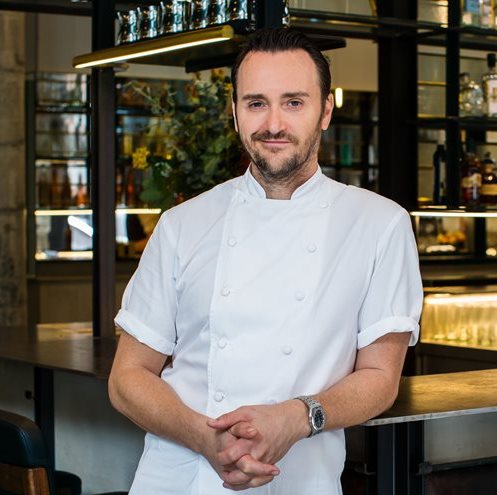With more than a dozen restaurants under his belt, UK-born chef Jason Atherton is somewhat of a global food trend himself. On his most recent trip to Australia, Atherton spoke with Hospitality about what’s trending around the world.
In 2011, Atherton launched his restaurant group, The Social Company, with the opening of Pollen Street Social in London. Six years on the group now has 17 venues. From London to Dubai, New York to Cebu and Hong Kong to Sydney, each restaurant needs to walk the tightrope between staying relevant and staying true to the brand’s identity.
“The reason why I evolve and change concepts all the time is because global food trends and people’s tastes change dramatically very, very quickly,” said Atherton. “Say for example, we take the tapas concept and roll that out across 10 countries, by the time you get to the last restaurant the concept will be out of date. So you have to evolve and come up with new menu ideas. It’s more interesting for the staff too.”
Part of the evolution is learning to adapt new trends to the existing menu, creating something new that doesn’t stray too far from each venue’s ethos.
“You have to be careful when something becomes a trend. Nordic cuisine has become highly desirable, but I’m from London, so it doesn’t make sense for me to start opening Nordic restaurants around the world. You have to keep what you’re known for while being inspired by what’s going on on a global scale – that’s what makes your food interesting,” said Atherton.
“I always say to my chefs, ‘never let a trend interfere with your food, let it enhance it’.
“So part of Nordic cuisine is about using wild ingredients and foraged food. It’s okay to infuse that into your menu, but don’t start putting pickled elderberries on the menu.”
At the end of the day, according to Atherton, things that work well in a specific time and place – like a town in the foothills of Sweden – won’t work when taken out of context. Instead, the culinary director recommends discussing the essence of trends and how they can work in individual venues.
“Japanese cuisine is very powerful around the world at the moment, so when we do our development meetings we discuss what the essence of Japanese cooking means to us – the simplicity, the intelligence of the ingredients, really emphasising the richness and the umami of the dishes – and then we introduce those elements into what we do on a daily basis. We don’t just start making sushi and sashimi,” said Atherton.
In Cebu, where Atherton opened The Pig & Palm in mid-2016, the chef is making the most of another global trend.
“In Cebu every restaurant imports foreign ingredients to make Western food, and then they have to charge a lot because it’s expensive to bring foreign ingredients in. So I used our experience to say, ‘well let’s be the first restaurant on the island of Cebu to look at the indigenous ingredients – which are trending globally at the moment – but treat them in a way to make modern Western food. And it’s been really successful; people can’t believe we’re using these things in our food,” he said.
“For example we buy lechon (suckling pig) from Carcar, but we’re doing a traditional British Sunday roast with apple, gravy, charred onion leaves [as opposed to the Philippine’s national dish of the same name]. It’s using your brain and we can sell it at a really good price.”
Every two to three months Atherton makes the voyage to Australia, where he works with the kitchen team at Kensington Street Social to make menu changes and analyse customer feedback. His job, he said, is to make sure the kitchen is moving in the right direction – and as a chef that comes and goes on a regular basis, Atherton is keenly aware of how our dining culture is evolving.
“You notice all sorts of things, new restaurants opening up, young chefs coming up, big name foreign chefs coming in. I noticed a couple of years ago in Sydney that there weren’t as many foreign chefs, but now there’s an influx. It’s not the be-all and end-all, of course it’s not, but I think it’s important for Australia to get that. Like London 10 years ago; we didn’t have many foreign chefs, now it’s awash with them and we’re better off for it,” he said.
Alongside the influx of international trends, Australia is also at the forefront of the increasing push to use local and indigenous ingredients in restaurant kitchens.
“It’s really cool that people are now starting to be proud of Australian cuisine. Watching people like Rene Redzepi come here and use 100 percent Australian ingredients, stuff people would turn their noses up at five years ago, was amazing. And what people like James Viles at Biota are doing is fantastic. It’s really powerful stuff.”

